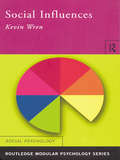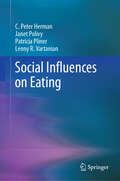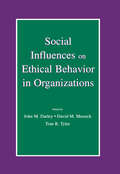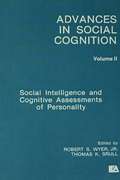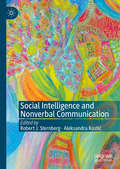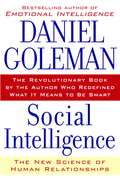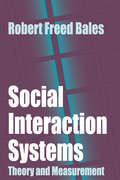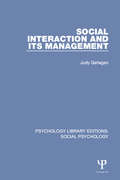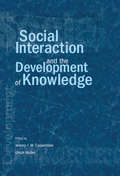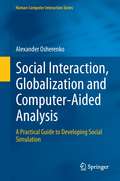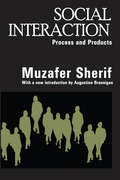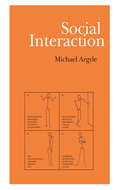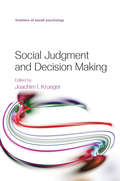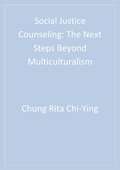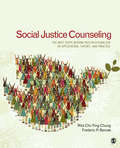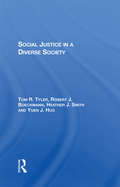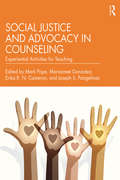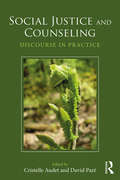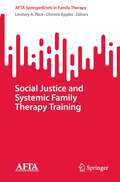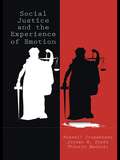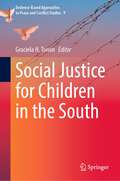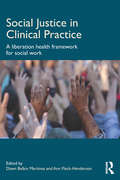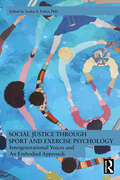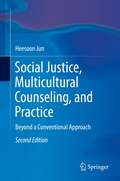- Table View
- List View
Social Influences (Routledge Modular Psychology)
by Kevin WrenSocial Influences looks at how we perceive ourselves and others and how this can influence our behaviour. It includes stereotyping and prejudice, obedience and conformity, collective behaviour and leadership.
Social Influences on Eating
by C. Peter Herman Janet Polivy Patricia Pliner Lenny R. VartanianThis book examines how the social environment affects food choices and intake, and documents the extent to which people are unaware of the significant impact of social factors on their eating. The authors take a unique approach to studying eating behaviors in ordinary circumstances, presenting a theory of normal eating that highlights social influences independent of physiological and taste factors. Among the topics discussed:Modeling of food intake and food choiceConsumption stereotypes and impression managementResearch design, methodology, and ethics of studying eating behaviorsWhat happens when we overeat?Effects of social eatingSocial Influences on Eating is a useful reference for psychologists and researchers studying food and nutritional psychology, challenging commonly held assumptions about the dynamics of food choice and intake in order to promote a better understanding of the power of social influence on all forms of behavior.
Social Influences on Ethical Behavior in Organizations (Organization and Management Series)
by Tom R. Tyler David M. Messick John M. DarleyFor too long, organizational scientists have not adequately attended to the problems of unethical behavior in organizations. This collection of essays provides the stimulus needed to help move the study of unethical behavior to center stage in the organizational sciences. It does so by posing provocative questions that not only entail a concern for understanding unethical behavior but that also strike at the very core of how and why organizations function as they do. The book addresses: * the asymmetries in power and influence created by hierarchies that give rise to ethical problems; * the tactics that might reduce the effectiveness of improper influence attempts; and * how the inappropriate use of influence diffuses, for example, through a market.
Social Influences on Romantic Relationships
by Christopher R. AgnewHow do we choose a partner to initiate a relationship with, and what makes us stay in a given relationship over time? These questions are most often pursued by scholars with an emphasis on the internal thoughts, feelings, and motivations of individual decision-makers. Conversely, this volume highlights the importance of considering external influences on individual decision-making in close relationships. Featuring contributions from internationally renowned scholars, the volume is divided into two interrelated sections. The first section considers global and societal influences on romantic relationships and the second focuses on social network and communicative influences on romantic relationships. Taken together, this collection helps us to better understand how external factors influence the internal machinations of those involved in intimate relationships.
Social Intelligence and Cognitive Assessments of Personality: Advances in Social Cognition, Volume II (Advances in Social Cognition Series)
by Robert S. Wyer Jr. Thomas K. SrullThis volume presents a new conceptualization of personality and social cognition that addresses both traditional and new issues. Written for students of personality, experimental and consumer psychology and cognitive science.
Social Intelligence and Nonverbal Communication
by Robert J. Sternberg Aleksandra KostićThis book offers a comprehensive overview of the latest developments in the social psychology of nonverbal communication. It explores topics including social skill, empathy, adaptive advantage, emotion-reading and emotion-hiding; and examines personal charisma, memory and communicating with robots. Together, the authors present diverse, cutting-edge research on nonverbal social intelligence as an adaptive strategy for survival and success. The collection provides an effective demonstration of the interdisciplinary nature of this topic, and it’s relevance to researchers across the social sciences and beyond.
Social Intelligence: The New Science Of Human Relationships
by Daniel GolemanEmotional Intelligence was an international phenomenon, appearing on the New York Times bestseller list for over a year and selling more than five million copies worldwide. Now, once again, Daniel Goleman has written a groundbreaking synthesis of the latest findings in biology and brain science, revealing that we are "wired to connect" and the surprisingly deep impact of our relationships on every aspect of our lives.Far more than we are consciously aware, our daily encounters with parents, spouses, bosses, and even strangers shape our brains and affect cells throughout our bodies--down to the level of our genes--for good or ill. In Social Intelligence, Daniel Goleman explores an emerging new science with startling implications for our interpersonal world. Its most fundamental discovery: we are designed for sociability, constantly engaged in a "neural ballet" that connects us brain to brain with those around us.Our reactions to others, and theirs to us, have a far-reaching biological impact, sending out cascades of hormones that regulate everything from our hearts to our immune systems, making good relationships act like vitamins--and bad relationships like poisons. We can "catch" other people's emotions the way we catch a cold, and the consequences of isolation or relentless social stress can be life-shortening. Goleman explains the surprising accuracy of first impressions, the basis of charisma and emotional power, the complexity of sexual attraction, and how we detect lies. He describes the "dark side" of social intelligence, from narcissism to Machiavellianism and psychopathy. He also reveals our astonishing capacity for "mindsight," as well as the tragedy of those, like autistic children, whose mindsight is impaired.Is there a way to raise our children to be happy? What is the basis of a nourishing marriage? How can business leaders and teachers inspire the best in those they lead and teach? How can groups divided by prejudice and hatred come to live together in peace? The answers to these questions may not be as elusive as we once thought. And Goleman delivers his most heartening news with powerful conviction: we humans have a built-in bias toward empathy, cooperation, and altruism-provided we develop the social intelligence to nurture these capacities in ourselves and others.From the Trade Paperback edition.
Social Interaction Systems: Theory and Measurement
by Robert BalesSocial Interaction Systems is the culmination of a half century of work in the field of social psychology by Robert Freed Bales, a pioneer at the Department of Social Relations at Harvard University. Led by Talcott Parsons, Gordon W. Allport, Henry A. Murray, and Clyde M. Kluckhohn, the Harvard Project was intended to establish an integrative framework for social psychology, one based on the interaction process, augmented by value content analysis. Bales sees this approach as a personal involvement that goes far beyond the classical experimental approach to the study of groups.Bales developed SYMLOG, which stands for systematic multiple level observation of groups. The SYMLOG Consulting Group approach was worldwide as well as interactive. It created a data bank that made possible a search for general laws of human interaction far beyond anything thus far known. In his daringsearch for universal features, Bales redefines the fundamental boundaries of the field, and in so doing establishes criteria for the behavior and values of leaders and followers. Bales offers a new "field theory," an appreciation of the multiple contexts in which people live.Bales does not aim to eradicate differences, but to understand them. In this sense, the values inherent in any interaction situation permit the psychologist to appreciate the sources of polarization as they actually exist: between conservative and liberal, individualistic and authoritarian, libertarian and communitarian. Bales repeatedly emphasizes that the mental processes of individuals and their social interactions take place in systematic contexts which can be measured. Hence they permit explanation and prediction of behavior in a more exact way than in past traditions. Bales has offered a pioneering work that has the potential to move us into a new theoretical epoch no less than a new century. His work holds out the promise of synthesis and support for psychologists, sociologists, and all who work with groups and organizations of all kinds.
Social Interaction and its Management (Psychology Library Editions: Social Psychology)
by Judy GahaganOriginally published in 1984, this book is concerned with our everyday behaviour with other people. It examines the nature of social interaction and the resources utilized in our engagement with others, and the ways in which these processes may be controlled and resources improved. Two themes are central to the book. One is the relationship between the intuitive psychology of everybody and the psychology of the professional scientist. The other is the shift in practice from the professional as expert and controller of the therapeutic processes towards self-management by the client. This is an essential guide for both students and professionals, and for anyone who would like to bring their social processes under more control.
Social Interaction and the Development of Knowledge
by Jeremy I. M. Carpendale and Simon Fraser UniversityWritten by highly respected theorists in psychology and philosophy, the chapters in this book explicate and address fundamental epistemological issues involved in the problem of the relationship between the individual and the collective. Different theoretical viewpoints are presented on this relationship, as well as between the nature of rationality and morality, relativism and universalism, and enculturation and internalization. Many chapters also highlight similarities and differences between these alternative frameworks and Piaget's theory, and thus correct the misperception that Piaget had nothing to say about the social dimension of development. Other chapters focus on the implications of these debates for the important topic areas of pedagogy, moral development, and the development of social understanding in infancy and childhood. Although Piaget's theory is presented and evaluated by some of the chapters in this collection, the authors remain critical and do not shy away from revising or extending Piaget's theory whenever it is deemed necessary. Though the topic covered in this book is of fundamental importance in the social sciences, it is rarely addressed in a sustained way as it is in this collection of chapters. The book benefits social scientists interested in fundamental epistemological issues, especially as these concern the relationship between the individual and the collective, with implications for the conceptualization of morality and rationality.
Social Interaction, Globalization and Computer-Aided Analysis
by Alexander OsherenkoTackling globalization is a great challenge - it is both extremely beneficial and essentially problematic. This comprehensive, multidisciplinary study confronts this ambivalence through the use of computer simulation. It discusses the findings of social interaction and social simulation through the use of understandable global examples. Readers can use this book as a tool to outline significant aspects of intercultural simulation and highlight the issues that need to be considered in the reader's analysis. The author leads the reader via sequential narration from a colloquial description of intercultural situations to final simulation prototypes; each step is accompanied by descriptive comments and program code. Social Interaction, Globalization and Computer-aided Analysis shows the reader how to acquire intercultural data from seemingly inconceivable information sources. Researchers and software developers engaged in interdisciplinary research projects in the field of Human-Computer Interaction will find this book to be a useful companion in their work. Alexander Osherenko is the founder of the start-up company Socioware Development, which implements psychologically-, sociologically- and culturally-aware software that scrutinizes information based on the findings of the cognitive sciences. Solutions created by Socioware Development can be implemented across a vast spectrum of industries, including car manufacturing, insurance and banking, Internet search engines and e-retailers.
Social Interaction: Process and Products
by Muzafer SherifReflecting the many contributions of Muzafer Sherif to social psychology during the past thirty years, this volume presents selections from among Sherif's most widely known essays and provides a systematic overview of his evolving interests, concepts, methods and research findings. Twenty-five essays are divided into five sections according to content; the theoretical and methodological problems at the heart of Sherif's work; the experimental model for interaction process and products; problems of self and reference groups; concepts, attitudes and ego-involvements; and contributions to problems of in-group and intergroup relations through experimental and field research. Though the selections range over a broad spectrum each is characterized by the precise and incisive work techniques Sherif devised as well as by its intrinsic relevance to significant issues. Sherif writes to clarify theory, to define conceptual tools, and to use tools and theory to demonstrate the substantive results of his researches. Each research finding is added to its predecessors as the author advances to his goal of a social psychology that is consistent as it moves from the most basic psychological processes to the complexities of individual involvement in collective activity
Social Interaction: Process and Products (Social Science Paperbacks Ser.)
by Michael ArgyleThis is the first book-length work to reflect the recent trend in social psychology away from artificial laboratory test results. It focuses directly on the detailed, concrete elements of social behavior as they are observed in a real-life setting. Michael Argyle's approach here differs from that more generally taken in two respects. First, he discusses human interaction in terms of the basic elements of behavior-bodily and facial movements, gestures, eye-movements, facial expression, proximity, and orientation, the verbal and non-verbal aspects of communication. Second, he has drawn on research in such varied areas as psychiatry, anthropology, linguistics, ethology, developmental and organizational psychology, as well as on his own extensive experimental studies. Particular emphasis is given to the biological roots of interaction, and to its cultural setting. Social Interaction demonstrates a strong awareness of the current theories of social psychology, while restricting itself in exposition to the observable aspects of human interaction. The result is a comprehensive and stimulating introduction to social interaction. This is primarily a textbook for students of social psychology, but it covers a field that is of central importance for all students of the social and biological sciences.
Social Judgment and Decision Making (Frontiers of Social Psychology)
by Joachim I. KruegerThis volume brings together classic key concepts and innovative theoretical ideas in the psychology of judgment and decision-making in social contexts. The chapters of the first section address the basic psychological processes underlying judgment and decision-making. The guiding question is "What information comes to mind and how is it transformed?" The second section poses the question of how social judgments and decisions are to be evaluated. The chapters in this section present new quantitative models that help separate various forms of accuracy and bias. The third section shows how judgments and decisions are shaped by ecological constraints. These chapters show how many seemingly complex configurations of social information are tractable by relatively simple statistical heuristics. The fourth section explores the relevance of research on judgment and decision making for specific tasks of personal or social relevance. These chapters explore how individuals can efficiently select mates, form and maintain friendship alliances, judiciously integrate their attitudes with those of a group, and help shape policies that are rational and morally sound. The book is intended as an essential resource for senior undergraduates, postgraduates, researchers, and practitioners.
Social Justice Counseling: The Next Steps Beyond Multiculturalism
by Rita Chi-Ying Chung Frederic P. BemakDirected mainly at higher education counselors and teachers for their curricula, this text focuses on applications, tools, and models of global issues in social justice counseling. Chung and Bemak (both in education and human development at George Mason U. ) offer unique perspectives on the changing issues of mental health in individuals whose race, ethnicity, class and environment often subject them to social injustices. Theories of multicultural counseling, human rights, relationship between power and justice, types of advocacy and goals to promote action are central to the text. Case studies and examples of various groups are presented. Annotation ©2011 Book News, Inc. , Portland, OR (booknews. com)
Social Justice Counseling: The Next Steps Beyond Multiculturalism
by Frederic P. Bemak Rita Chi-Ying ChungThis text develops a new frontier in multicultural social justice work and is the next step toward alleviating the injustices faced by individuals in society. Addressing issues of social class, race and ethnicity, and more, this book reflects the shift in recent years towards social justice counseling for all mental health professionals. It offers new and unique perspectives supplementing important social justice issues and enhancing the content taught in multicultural courses. The authors are leading authorities on multicultural and social justice counseling and have led the way to create a specialization with a nationally recognized program in multicultural social justice counseling.
Social Justice In A Diverse Society
by Tom Tyler Robert J Boeckmann Heather J Smith Yuen J HuoIssues of social justice have been an important part of social psychology since the explosion of psychological research that occurred during and after World War II. At that time, psychologists began to move away from earlier theories that paid little attention to people's subjective understanding of the world. As increasing attention was paid to people's thoughts about their social experiences, it was discovered that people are strongly affected by their assessments of what is just or fair in their dealings with others. This recognition has led to a broad range of studies exploring what people mean by justice and how it influences their thoughts, feelings, and behaviors.
Social Justice and Advocacy in Counseling: Experiential Activities for Teaching
by Mark Pope Mariaimeé Gonzalez Erika R.N. Cameron Joseph S. PangelinanSocial Justice and Advocacy in Counseling provides a thorough and up to date grounding in social justice and advocacy for counseling students and faculty. Chapters address issues of discrimination and oppression and their effect on individuals and cultural groups through a variety of activities and handouts related to each of the eight CACREP core standards. The book’s final section focuses on activities and handouts related to counseling specialties, including school, career, and addictions counseling. This book will help counselor educators increase student awareness, knowledge, and skills. For students, the practical activities bring the concept of social justice alive in important ways and will continue to be a handy reference as they develop their careers and promote access and equity.
Social Justice and Counseling: Discourse in Practice
by Cristelle Audet David PareSocial Justice and Counseling represents the intersection between therapy, counseling, and social justice. The international roster of contributing researchers and practitioners demonstrate how social justice unfolds, utterance by utterance, in conversations that attend to social inequities, power imbalances, systemic discrimination, and more. Beginning with a critical interrogation of the concept of social justice itself, subsequent sections cover training and supervising from a social justice perspective, accessing local knowledge to privilege client voices, justice and gender, and anti-pathologizing and the politics of practice. Each chapter concludes with reflection questions for readers to engage experientially in what authors have offered. Students and practitioners alike will benefit from the postmodern, multicultural perspectives that underline each chapter.
Social Justice and Systemic Family Therapy Training (AFTA SpringerBriefs in Family Therapy)
by Lindsey A. Nice Christie EpplerThe book examines the lived experiences of systemic family therapy educators. It addresses the issues of power and justice that they face in family therapy training programs, including their teaching experiences with students, interactions with faculty, and challenges within academic institutions. It describes how family therapy programs attempt to incorporate cultural awareness with mixed results (e.g., focusing only on how to work with diverse clients or not supporting faculty from across social locations). The book explores the ways in which family therapy educators with intersecting marginalized identities continue to be oppressed across different areas of academia.The book addresses issues of power that systemic family therapy educators face within the academia itself at three different levels:Personal interactions with students that create more complete understanding of issues of power.Professional interactions with colleagues that provide support and accountability.Political interventions aimed at changing the larger academic institution.Chapters focus on countering unjust practices in academic settings. Authors reflect on personal experiences across these three levels and, then, offer concrete suggestions for intervention. These include teaching experiences or meaningful interactions with students that support empowerment or increased awareness; relationships with colleagues that promote accountability and growth; and needed changes or challenges to the larger structure of academia.Social Justice and Systemic Family Therapy Training is an essential resource for clinicians, therapists, and practitioners as well as researchers, professors, and graduate students in family studies, clinical psychology, and public health as well as all interrelated disciplines.
Social Justice and the Experience of Emotion
by Russell Cropanzano Jordan H. Stein Thierry NadisicThis book seeks to integrate the scholarship on justice and affect. The authors focus on empirical social scientific theories pertaining to fairness, mood and emotion. Most of the literature in this book is drawn from social and organizational psychology. Other areas included are management, personality and evolutionary psychology. The book includes coverage of relevant philosophical positions from Aristotle and Rawls. The goal of this book is to familiarize the reader with the rich tradition of conceptual models explaining the association between justice and emotion. It will be of interest to graduate students, researchers and practitioners in industrial organizational psychology, social psychology, management and business ethics.
Social Justice for Children in the South (Evidence-Based Approaches to Peace and Conflict Studies #9)
by Graciela H. TononThis book considers that contextual factors are important for the achievement of social justice and it recognizes that vulnerability to which children are exposed is a phenomenon throughout the planet, particularly in the South. It presents a theoretical review of social justice as well as different situations of vulnerability children experience in their daily lives in which they can be injured, affecting their well-being and the exercise of their rights. It examines the impact of the COVID-19 pandemic on children, considered as a vulnerable group warranting special social policy considerations. It also presents the need to change power structures in knowledge production and decision-making processes to achieve social justice for children; the importance of investing in children; the exclusion of children from participation in certain activities and the shame of not being able to participate in equal conditions with others; the lives of migrant children belonging to ethnic minorities exposed to language barriers and access to technological devices; and the analysis of the process of social re-integration of children from conditions of armed conflict. The book concludes that governments need to assume social justice as part of universal human interests, providing security, conditions for well-being, and guaranteeing social justice for all children.
Social Justice in Clinical Practice: A Liberation Health Framework for Social Work
by Dawn Belkin Martinez Ann Fleck-HendersonSocial work theory and ethics places social justice at its core and recognises that many clients from oppressed and marginalized communities frequently suffer greater forms and degrees of physical and mental illness. However, social justice work has all too often been conceptualized as a macro intervention, separate and distinct from clinical practice. This practical text is designed to help social workers intervene around the impact of socio-political factors with their clients and integrate social justice into their clinical work. Based on past radical traditions, it introduces and applies a liberation health framework which merges clinical and macro work into a singular, unified way of working with individuals, families, and communities. Opening with a chapter on the theory and historical roots of liberation social work practice, each subsequent chapter goes on to look at a particular population group or individual case study, including: LGBT communities Mental health illness Violence Addiction Working with ethnic minorities Health Written by a team of experienced lecturers and practitioners, Social Justice in Clinical Practice provides a clear, focussed, practice-oriented model of clinical social work for both social work practitioners and students.
Social Justice through Sport and Exercise Psychology: Intergenerational Voices and An Embodied Approach
by Leslee A. FisherSocial Justice Through Sport and Exercise Psychology: Intergenerational Voices and An Embodied Approach provides a narration of the history of social justice work in sport and exercise psychology as advanced through the voices of those leaders who have dared to imagine a more just and equitable sporting world. By situating their history through critical genealogy, within an analysis of the larger social relationships of power in both the competitive sporting context and the field of sport and exercise psychology (including patriarchy, sexism, racism, classism, ableism, and homonegativity), an effort is made to illuminate their political lineages and how these individuals utilized social justice theories and critical reflexivity in their work. The fourfold purpose of this brand new and cutting-edge volume is to (1) frame the critical genealogy and political lineages of leaders in the field of sport and exercise psychology, who have promoted social justice in their work; (2) provide an autobiographical sketch for each of the authors that chronicles the ways their life experiences and trajectories have influenced their respective philosophies of social justice; (3) flesh out how those philosophies are evidenced, both implicitly and explicitly, in their work; and (4) illustrate how a social justice framework has informed their respective consulting philosophies.Social Justice Through Sport and Exercise Psychology: Intergenerational Voices and An Embodied Approach is key reading not only for scholars, students, and practitioners in the field of sport and exercise psychology but also for those in the subdisciplines of sport sociology, athletic training, and strength and conditioning, as well as licensed professional counsellors, licensed clinical social workers, and certified athletic trainers.
Social Justice, Multicultural Counseling, and Practice: Beyond A Conventional Approach
by Heesoon JunThis second edition book provides an update to multicultural psychology and counseling research findings, and the DSM-5 in sociopolitical and cultural contexts. It links social psychology with current cognitive science research on implicit learning, ethnocentrism (attribution error, in-group favoritism, and asymmetric perception), automatic information processing, and inappropriate generalization. Chapters discuss the interwoven characteristics of multiple identities of individuals such as race, gender, class, disability, age, religion, region, and sexual orientation. In addition, the book offers concrete strategies to facilitate inner-dialogue and discussion of self-perception and interpersonal relationships. Featured topics in this book include: Intrapersonal communication and the biases that can be involved. The impact of a provider’s personal values and beliefs on assessing and treating clients. The Social Categorization Theory of Race. The Social Categorization Theory of Gender. The Social Dominance Theory of Class. Identity Construction, Multiple Identities, and their intersectionality. Social Justice, Multicultural Counseling, and Practice, Second Edition will be of interest to researchers and professors in clinical psychology, counseling psychology, multicultural psychology, social psychology, cognitive neuroscience, social work, social justice, equity, and inclusion work as well as health care providers.
